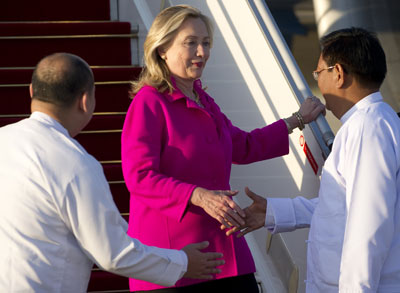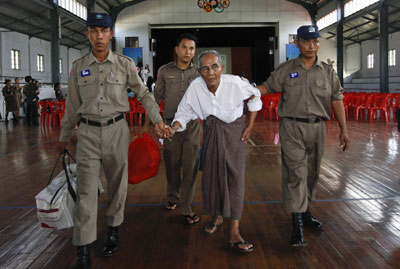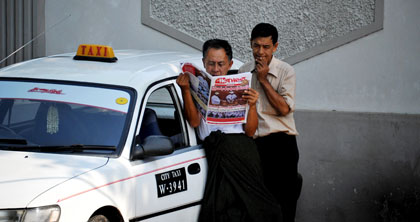
Clinton must tread carefully in Burma
When U.S. Secretary of State Hillary Clinton meets this week with Burmese President Thein Sein, opposition leader Aung San Suu Kyi, and senior ranking members of the military establishment, she conspicuously will not have the opportunity to meet with journalist Sithu Zeya. Sithu was detained by police after recording the impact of a bomb that…

Watching Burma’s prisoner release
CPJ and other Burma watchers are monitoring the announcements of the unfolding prisoner release closely. As a press freedom organization, we’ve focused most closely on the fate of the 14 journalists we counted in jail in Shawn Crispin’s report, “In Burma, transition neglects press freedom” that we posted on September 20. In our alert today…

Free Burma VJ campaign urges release of journalists
From Paris to Bangkok, London to Geneva, the Free Burma VJ campaign will stage protests in front of Burmese embassies on Friday to call for the immediate release of 17 jailed video journalists working for the Democratic Voice of Burma (DVB), a leading Burmese exile media organization. The campaign began less than two months after Burma’s…

Press freedom requires action, not talk, in Burma
Burma’s newly installed democratic government has sent tentative signals that it intends to allow for more media openness as the country transitions from military to civilian rule. The continued detention of more than 2,100 political prisoners, including as many as 25 journalists, however, belies President Thein Sein’s recent press-promoting pronouncements.
Burmese exile news site endures hacking, DDoS attacks
Like other Burmese exile-run media, the Irrawaddy has been plagued by numerous denial-of-service (DDoS) attacks in recent years that have forced its website to be shut down. Now, Aung Zaw, the publication’s founder and editor, believes Burma’s military-backed regime has adopted a new cyber-attack strategy that aims to undermine the exile media’s credibility among readers.
Protecting yourself from denial-of-service attacks
It’s my second link to a report by Hal Roberts (and others at the Berkman Center) in as many days, but I worry that this this detailed document on denial-of-service (DOS) and hacking attacks on independent media and human rights groups might get missed in the holiday season. The news headlines in the last few…
Internet Blotter
Microsoft allows users to turn on https by default in Hotmail, but it’s still couched in warnings. Meanwhile, Access starts its own global campaign for https to be turned on for the most visited websites. Thai censorship, originally aimed at a few hundred domains, now covers over 250,000 websites. China “unpublishes” previously approved online articles…
Internet Blotter
Turkey lifted its ban on YouTube and then re-asserted it within the same week. Digital technology is helping get news out of North Korea. Small digital cameras and tiny SD memory cards make it easier to smuggle images out. In China, meanwhile, Amazon’s Kindle 3G e-reader is reportedly being used to get the news in.…
The Burmese Internet on the eve of election
Burma tops CPJ’s “10 Worst Countries to be a Blogger.” With the scheduled general election in the country approaching, there have been reports of growing interference with both local and exiled journalists. As Burma enters the final stretch of the campaign, CPJ’s senior South East Asia representative, Shawn Crispin, give me a brief summary of the…
Internet blotter
The International Telecommunications Union starts its plenipotentiary meeting this week. Some worry that some nations will use their position at the ITU to attempt to grab more control over how the Internet works. RSF covers the Burmese DDOS attacks. I’ve heard some really fascinating detective work on the real origins of these attacks – hope…